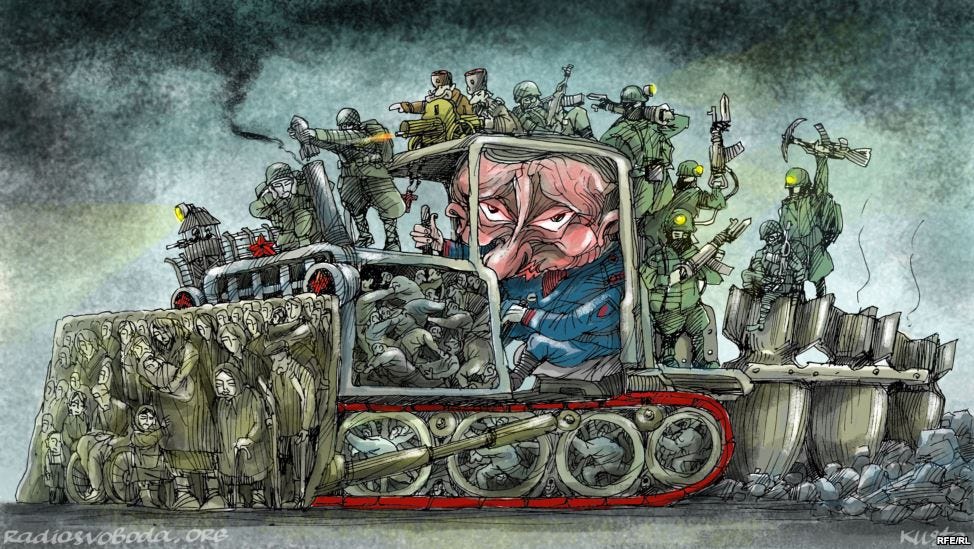Three bullet-points
June 5, 2023
NO to nuclear war!
Consolidation of “Prigozhin’s electorate”
The young generation doesn’t want to know
As part of the May poll by the Levada-Center, I tested the “adequacy” of the Russian population on the question of the possible consequences of the war in Ukraine going nuclear. I was prompted to do so by the results of the April poll, which found that nearly 30% of respondents believed that the Russian leaders were ready to use nuclear weapons in hostilities and that the use of nuclear weapons would be justified. This time, respondents were asked to express their position by answering the question: To win in Ukraine, should Russia use nuclear weapons or should it not use nuclear weapons under any circumstances?
Responses received: 10% of respondents supported the former position, and 86% supported the latter, with 68% doing so “definitely”—suggesting that, despite the ongoing influence of the Kremlin propaganda machine, Russians know there can be no winners in a nuclear war. Sober-mindedness was displayed by virtually all categories of respondents, regardless of age, place of residence, education, income level, etc. Once again, Moscow was slightly more “aggressive” against the general background: The share of those supporting nuclear weapons was 50% higher in the capital (15%). In comparison, the percentage of those who oppose it (79%) was somewhat lower. However, although these differences are within confidence intervals, one would think they should not be given serious weight—the gap between the “nuclear” hawks and doves is too significant.
The results of the answer to another question—Would you support the decision of the Russian authorities to immediately stop the SMO (Special Military Operation) and the withdrawal of Russian troops from the territory of Ukraine?—allow me to formulate several arguments that challenge the popular viewpoint among experts. Since last summer, in polls, the proposal to begin peace talks has received somewhat more support than the proposal to continue military activities (however, in the May Levada poll, the balance of responses shifted in favor of the “hawks,” 48% vs. 45%). One often hears the following explanation: Since then, the Russian leadership, including Vladimir Putin, frequently mentioned its readiness to negotiate the end of the war with Ukraine (albeit “subject to our demands”), which was reflected in the respondents’ answers.
In my view, in answering whether to negotiate peacefully or to continue the war, respondents had to decide for themselves and could be motivated to give the answers according to official narratives. In the alternative question, the responsibility for the decision was “shifted” to the Russian authorities, and the respondent was asked to support or not support such a decision. Because the answers to the alternative question did not differ much from the choice between the start of negotiations and the continuation of the war—43% would support the decision of the authorities to stop the SMO and the withdrawal of Russian troops, while 49% would not—it can be stated that a stable “Prigorodny electorate” has emerged in the Russian society, which will oppose potential anti-war sentiment in the Kremlin and whose opinion the Kremlin cannot ignore. In quantitative terms, this group comprises about a quarter of the adult population, mainly middle-aged and older men (45 years +), for whom the official media (TV, radio, and newspapers) are the primary information sources.
During the May poll, I continued to examine the “information bubble” in which a significant portion of the Russian population has placed itself. Answering the question, Have you ever encountered news that evoked sympathy for citizens of Ukraine suffering from hostilities?,40% of the respondents said it happened never or very rarely.
This share is significantly lower among women and older respondents (65+), which is easy to explain, while it does not fall below 30% (35% and 30%, respectively). On the other hand, the high value of this indicator for young respondents (18-24 and 25-34 years old, 47% and 45%, respectively) may serve as additional confirmation of the existence of an “information bubble.” Respondents of younger ages, for whom mobilization could become a reality at any moment, consciously do not want to see anything that disturbs their perception of the world—about 40% of respondents from these age groups “without much attention” follow the events in Ukraine, and another 20% do not follow them at all.



